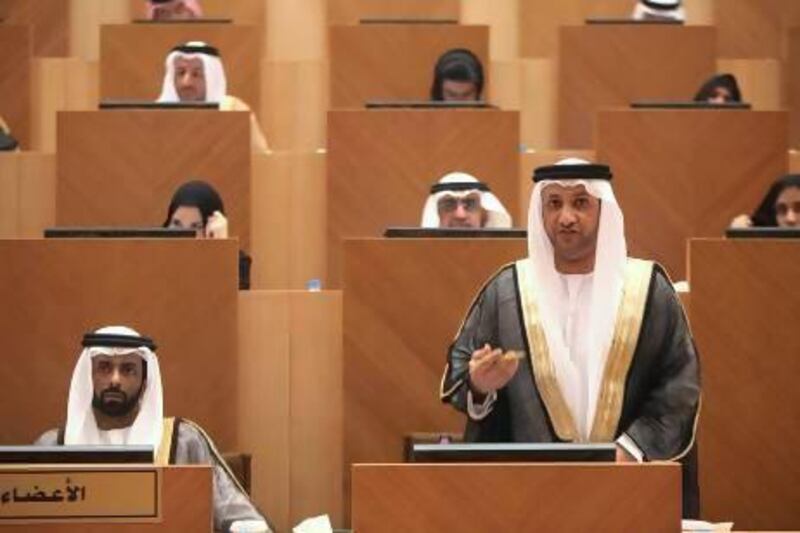ABU DHABI // The Marriage Fund has no right to tell Emiratis not to marry foreigners, the FNC was told yesterday.
Dr Maitha Al Shamsi, the head of the fund, told Ali Al Nuaimi (Ajman) that a requirement for it to strongly discourage mixed marriages had been removed from law.
“This is personal freedom,” said Dr Al Shamsi, who is also a Minister of State. “We removed this clause since we observe the highest standards of human rights.
“So Emirati men marrying foreigners, which the member referred to, we do not study it. But we study negative effects of marrying non-UAE nationals.”
Mr Al Nuaimi said discouraging Emirati men from marrying foreigners was mentioned on the fund’s website, despite the legal amendment.
Dr Al Shamsi said that even though it was not part of its mandate, the fund encouraged Emirati men to marry UAE nationals, and warned families of the negative consequences of unions with foreigners.
She said the fund had recently raised the salary cap for being able to claim the marriage benefit to Dh20,000 a month.
Even with the increase, Mr Al Nuaimi said some young people were still unable to benefit from the fund. “So either they go in debt or go to foreigners.”
He said official figures showed 652 Emirati women married non-Emiratis in 2011, while 2,009 Emirati men married foreigners.
“The federal law did not specify a salary cap, just that benefits should go to those with limited income or who cannot afford to marry,” Mr Al Nuaimi said.
“There are many with higher salaries who can’t afford to marry. Why doesn’t the fund study this instead of refusing them aid?”
Dr Al Shamsi said the fund and the Ministry of Economy had studied what should be regarded as a limited income, and came up with a figure of Dh13,000, well below the Dh20,000 cap.
She said someone earning Dh20,000 should be able to save enough to marry.
“If he’s living with his family, he can save a huge amount,” she said.
Lowering the cost of marriage was one of the fund’s main goals, so benefits were not “thrown away” on big weddings but spent on building families, Dr Al Shamsi said.
Seminars encouraging national marriages had been well received, she added.
But Mr Al Nuaimi said he would like to see the fund’s whole strategy, and for the council to study the requirements to receive a grant from the fund.
Dr Al Shamsi said the fund renewed its strategy every three years with the Cabinet’s approval.
She was then asked about the removal in 2010 of the requirement for the fund to have a committee in every emirate, to which she said the committees had been superseded by online application for benefits.
“There are no complaints of lost applications, which is what the committees used to deal with,” Dr Al Shamsi said.
But Salem bin Hwiden (Sharjah), said the committees also had a social function, following up with newlyweds and overseeing the disbursement of fund grants.
“After removal of these the fund is only giving the money,” Mr bin Hwiden said.
He added that the committees also worked to encourage group weddings.
These were now being accepted by “tribal leaders” after Sheikh Mohammed bin Zayed, Crown Prince of Abu Dhabi and Deputy Supreme Commander of the Armed Forces, led by example in Abu Dhabi with his family taking part in a group wedding.
Dr Al Shamsi later said people should follow Islamic traditions in marriage. Lavish weddings were a modern concept, she said, with no basis in UAE culture or Islam.
“Big weddings were promoted socially until they became a burden on society,” Dr Al Shamsi said. “We need to change the idea of lavish weddings. We work hard to change the expectations of young people and parents about what a wedding should cost.”
Mr bin Hwiden said the FNC should ask the Cabinet to reinstate the local committees. More than half of the members agreed.
osalem@thenational.ae






